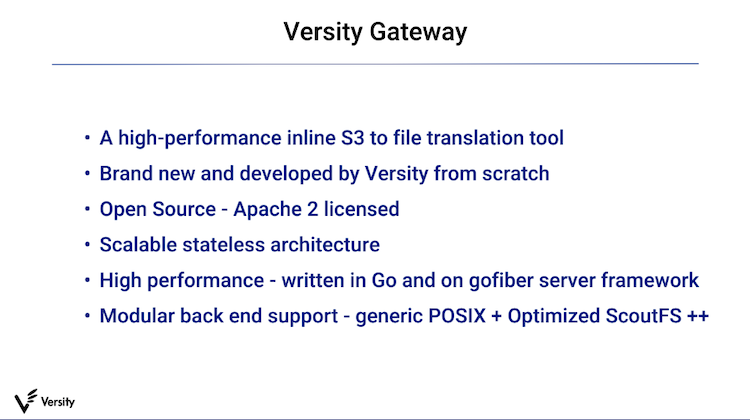Versity S3 Gateway
Offering high-performance open source S3 to file translation mechanism
This is a Press Release edited by StorageNewsletter.com on June 14, 2023 at 2:02 pmVersity Software, in collaboration with the Los Alamos National Laboratory and the Pawsey Supercomputing Research Centre, introduces its Gateway, an open source tool for seamless inline translation between AWS S3 object commands and file-based storage systems.
The Gateway serves as a bridge between file-based storage systems and applications that rely on S3 object interfaces. It enables applications to interact with file storage using familiar S3 operations like put and get, allowing for easy integration and compatibility. Built from scratch in Go, a highly efficient programming language known for its performance and scalability, the Gateway leverages Go’s benefits to deliver speed and efficiency.

“The Versity Gateway is our answer to the community’s need for a reliable open source object to file translation tool,” said Bruce Gilpin, CEO. “We want to provide seamless file storage capabilities for S3-based applications. We are excited to release the Versity Gateway as an Apache 2.0 open source project and we invite the community to contribute to its development, growth, and enhancement.”
Key features of the Gateway include:
- Scalability: Multiple Gateway instances may be deployed in a cluster to increase aggregate throughput. The Gateway’s stateless architecture allows any request to be serviced by any gateway thereby distributing workloads and enhancing performance. Load balancers may be used to evenly distribute requests across the cluster of gateways for optimal performance.
- High Performance: The Gateway utilizes gofiber, a lightweight and high- performance HTTP server framework, to handle incoming requests. Compared to older web frameworks like gorilla/mux, gofiber offers improved performance, resulting in faster processing and response times.
- Modular Backend Support: The Gateway currently supports generic POSIX file backend storage and Versity’s ScoutFS filesystem. The system has been designed with modularity in mind, making it easy for the community to add additional backend storage systems in the future.
- Open Source and Collaborative: As an Apache 2.0 licensed open source project, the Gateway encourages the community to contribute to its development, growth, and enhancement. The project’s source code is available to the public and can be accessed via its GitHub repository at https://github.com/versity/versitygw. Versity welcomes contributions and patch requests from the community.

Additionally, the Gateway seamlessly integrates with ScoutAM, Versity’s commercial mass storage data management product. By combining the power of the Gateway with ScoutAM’s advanced data management capabilities, users can efficiently store, retrieve, and manage large volumes of data across diverse storage systems. This integration enables organizations to leverage the Gateway as a critical component of their data infrastructure, ensuring seamless access to object storage and simplified data management workflows. With the Gateway and ScoutAM working together, users can maximize the value of their data while maintaining optimal performance and scalability.
“We are thrilled to offer our customers the improved ability to seamlessly leverage ScoutAM in conjunction with incoming S3 data,” said Meghan McClelland, VP of product. “This integration empowers customers to efficiently store and manage their incoming S3 data at scale, in the same namespace as their file data, enabling them to unlock high performance and economically efficient storage, creating an on-premises glacier.”
The Open Source Gateway is available for download from its source code repository https://github.com/versity/versitygw/.
More information on the Versity Gateway, visit https://www.versity.com/products/versitygw.
Comments
Several vendors, Versity and Qumulo among others, had to think about an alternative to the MinIO Gateway they used for a few years.
This very convenient gateway has been stopped by MinIO progressively and the company clearly noticed its ecosystem as this blog post illustrates. Since that, Qumulo has developed its own S3 service and now Versity does the same with this open source development.













 Subscribe to our free daily newsletter
Subscribe to our free daily newsletter

